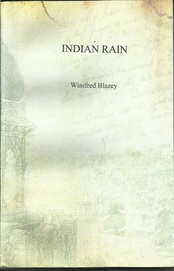
Winifred Blazey’s books, all published by Michael Joseph, who was also Mitchell’s publisher, include Dora Beddoe (1936), Indian Rain (1938), The Crouching Hill (1941), and Grace Before Meat (1942). While I don’t have copies of her first or last novels, Gyan Books in New Delhi, India, has made available the middle titles as utilitarian, print-on-demand softcover and hardcover books. The pages are essentially scans of the original Michael Joseph texts and typeface, which is readable and affordable. Abebooks currently has listings for these titles. Having just read Indian Rain, my first experience with a Winifred Blazey novel, I can enthusiastically report that the story is well worth the investment of money and reading time.
The book tells the wide-ranging story of Lovat Cleave, an Englishman who, as a very young man, leaves his hometown under a cloud – he returned fire when a groundskeeper shot at him for impetuous poaching, wounding the older man – and travels to coastal Bengal, where he starts work as a clerk for the East India Company near Calcutta. Initially, Lovat is overwhelmed and out of place in his new surroundings:
“The feeling of homesickness grew intense. He went off his food, made some serious mistakes in his accounts, kicked an Indian porter, struck his servant when he did not immediately comprehend an order, insulted two Englishmen of his father’s age, got drunk and was sick, and took his gun into the swamps one day to shoot himself, but came back with some birds instead.”
Another skirmish at the company (essentially a crime of self-defense) sends Lovat into the villages and among the people of regional India, and Indian Rain’s first half feels very episodic and experiential. This is by design, as the protagonist begins to observe and understand this world that is so very different from the order and morality he left behind in England. It is to the author’s great credit that the reader follows much the same learning curve as Lovat does. We cannot help being appalled by a village headman’s suggestion to bury a boy in the sand and start an elephant stampede so Lovat’s fortune can be read in the boy’s remains. Yet the anecdote clearly expresses the dichotomy of savagery and generosity, as well as reminding us – as does nearly every event within the book – that life is viewed much differently here, with death and pain inevitable, commonplace, and part of the cycle of rebirth.
It is the book’s second half where all of Lovat’s experiences begin to have a cumulative effect. At one village he witnesses the act of sati, a self-sacrifice where a widowed woman throws herself onto her husband’s blazing funeral pyre. The woman begins to scream and tries to get up, but relatives hold her down on the fire with staffs. Unable to stand by and watch, Lovat rescues her from the flames and rushes her to the river, but in doing so changes her status from a destined martyr to an untouchable. After the escape, he falls in love with the woman named Parbati, and they have a son, first called Krishna and later Narayan. (She also gives birth to two daughters, but as daughters are worthless in the Hindu caste system, each girl baby manages to die in her mother’s care before she is a year old.)
Once a true emotional connection is created, and Lovat goes from an (often in jeopardy) observer to an invested husband and father, Blazey delivers a story that is powerful and heart-breaking. It is also ambitious in scope, tracing the story of a man’s lifetime and showing how goals and perspectives can change as the decades pass. An interest in money and self-preservation transforms into a need to care and nurture others, which in turn leads to a mature desire to be at peace with nature and the gods.
There is a profound chapter near the end of the book chronicling a pilgrimage by father and son as they search for Parbati. Their path leads them into the snow-capped and potentially deadly mountains of the east, but throughout the described hardships and the brutal conditions – the author’s prose is vividly sensory here – there is also a mystical, fatalistic tone that feels truthful and right. It’s a moment of hard-won, realist transcendence, and when Lovat finally returns to his family estate in England, the reader understands fully why the man’s surroundings are now hollow and unsatisfying to him.
Indian Rain is a book that surprised me and sparked my admiration. It seems to be impeccably researched. There is so much detail and observation about societal customs, from Moslem and Hindi caste rules to the topography of coastal and central India to the expertly told narrative of an outsider becoming integrated into another culture, that the book becomes both easy to recommend and well worth experiencing again for its journey and its themes. I look forward to reading more titles from Winifred Blazey, and I thank Gladys Mitchell for introducing her companion and fellow writer to me.
 RSS Feed
RSS Feed